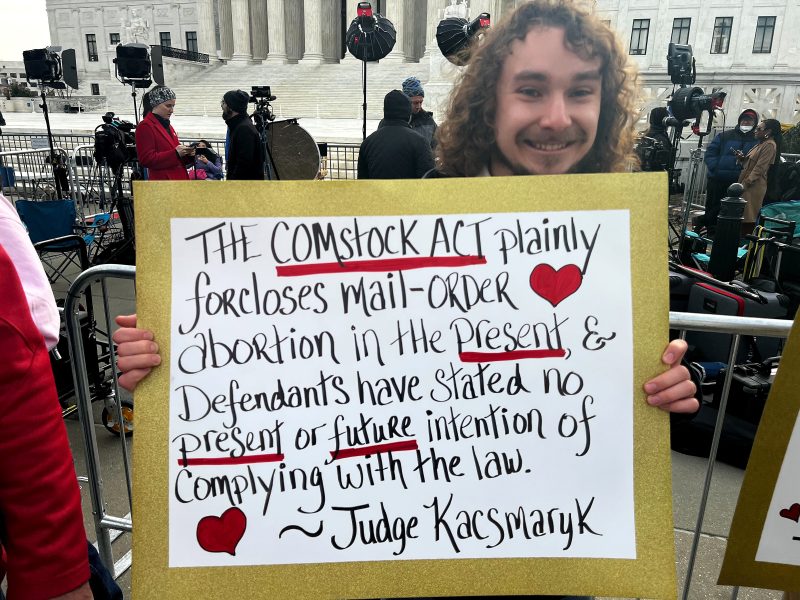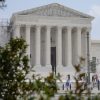Antiabortion activists have spent several years resurrecting the Comstock Act, arguing that a future Republican administration could use the 151-year-old law to block the mailing of all abortion-related drugs and materials to effectively ban abortions nationwide.
The Supreme Court may be about to hand them a legal road map.
Justices Samuel A. Alito Jr. and Clarence Thomas repeatedly invoked the Comstock Act during Tuesday’s oral arguments regarding the abortion drug mifepristone, pressing lawyers about whether the 1873 federal law should apply to abortion drugs sent through the mail today. Alito rejected the Biden administration’s argument that the law is obsolete — it has not been applied in nearly a century — with the conservative justice insisting that Food and Drug Administration officials should have accounted for the law when expanding access to mifepristone by mail in 2021.
“This is a prominent provision. It’s not some obscure subsection of a complicated, obscure law,” Alito said. “Everybody in this field knew about it.”
The Supreme Court is reviewing whether the FDA wrongly approved and expanded access to mifepristone, and based on questioning during Tuesday’s hearing, legal experts anticipate that the court will rule to preserve the health agency’s authority. But some experts and Biden officials fear Alito and Thomas are planning to write a separate opinion focused solely on the Comstock Act, arguing that the law remains viable and providing legal cover to a future administration that seeks to invoke it.
“When you hear the justices asking repeated questions, it’s definitely something that they are interested in,” University of Michigan law professor Leah Litman said, adding that she was bracing for Alito or Thomas to write an opinion focused on Comstock. She criticized the two justices for raising the theory that the Victorian-era law applies today, terming it “outlandish” to believe the Comstock Act “all of a sudden allows the federal government to start throwing providers and distributors of medication abortion into jail.”
“That has never been how the law has been understood by the Department of Justice or by the courts,” Litman said. “It’s always been narrowly interpreted.”
Pressed by Alito and Thomas, attorneys for the FDA and mifepristone manufacturer Danco Laboratories argued that the Comstock Act was not relevant when considering access to mifepristone.
“I think that the Comstock provisions don’t fall within FDA’s lane,” Solicitor General Elizabeth B. Prelogar said in response to questions from Alito.
But Erin Hawley, the attorney representing the Alliance for Hippocratic Medicine, the conservative medical group challenging the FDA’s handling of mifepristone, argued that the text of the law “is pretty clear.”
“We don’t think that there’s any case of this court that empowers FDA to ignore other federal law,” Hawley said in response to questions by Thomas. “The Comstock Act says that drugs should not be mailed … either through the mail or through common carriers.”
Federal courts have shown willingness to engage with that argument. U.S. District Judge Matthew Kacsmaryk, who ruled in April to suspend FDA approval of mifepristone, relied in part on the Comstock Act, saying the meaning of the law is clear from the text. The U.S. Court of Appeals for the 5th Circuit did not address Comstock when it ruled to restrict access to mifepristone in August.
The White House declined to comment on Alito and Thomas’s questions about Comstock, citing the ongoing litigation over mifepristone. The Biden administration has staunchly opposed efforts to interpret Comstock as banning the mailing of abortion drugs.
Former president and current GOP candidate Donald Trump has not commented on the Comstock Act. But some of his conservative supporters and members of the antiabortion movement have pushed for him to invoke the law if he returns to the presidency.
“If a future president were to enforce these federal statutes, then they could shut down every abortion facility in America,” Mark Lee Dickson, an antiabortion activist, told The Washington Post in a May interview. Dickson, along with former Texas solicitor general Jonathan Mitchell, revived efforts to apply the Comstock Act.
The law was named for Anthony Comstock, an anti-vice crusader who sought to impose his moral and legal rubric on the nation. The 19th-century measure banned the mailing of “indecent” materials such as pornography and sex toys but also included provisions limiting access to abortion and contraception drugs sent by mail.
More than 40 years after his namesake law was enacted, Comstock said he was dismayed that it was being used to interfere with physicians’ private practices. According to an interview published in the May 22, 1915, issue of Harper’s Weekly, Comstock said the law should target “only in-famous doctors who advertise or send their foul matter by mail. A reputable doctor may tell his patient, in his office what is necessary, and a druggist may sell on a doctor’s written prescription drugs which he would not be allowed to sell otherwise.”
Comstock added that some abortions were permissible. “A doctor is allowed to bring abortion in cases where a woman is in danger,” he is quoted as saying.
Following Tuesday’s arguments, Rep. Cori Bush (D-Mo.) called for Congress to repeal the law.
“The anti-abortion movement wants to weaponize the Comstock Act as a quick route to a nationwide medication abortion ban,” Bush wrote on X, formerly known as Twitter. “Not on our watch.”





























